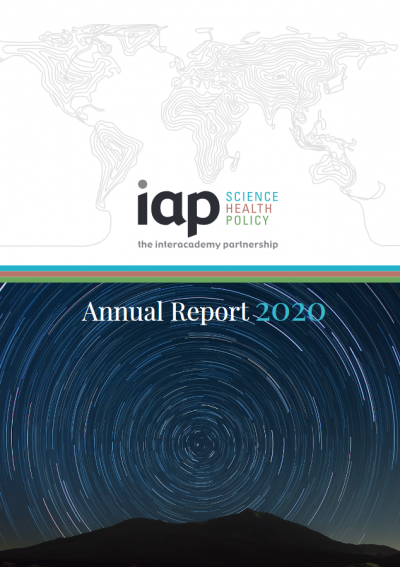


The new IAP Annual Report provides an overview of activities of the InterAcademy Partnership (IAP) in 2020, with specific sections on activities by affiliated regional networks AASSA, EASAC, IANAS, and NASAC. The Report also gives evidence of IAP’s focus on providing science advice and promoting cooperation and capacity building among its membership - the world’s merit-based academies of science, medicine and engineering.
You can download the full 2020 IAP Annual Report here.
The year 2020 will remain forever ingrained in our memory. The COVID-19 pandemic has thrown many challenges our way and many more still lie ahead. We often gazed in despair at the pain caused by the novel coronavirus. Some of us lost family members, colleagues and friends, and many more had their everyday lives turned upside down.
The InterAcademy Partnership (IAP) stands strong amidst the pandemic, underscoring the importance of coming together as a community that finds in science not only a common language, but also the key to a successful post-pandemic response and recovery.
Looking back at 2020, we are proud to have achieved so much despite the challenges. We adjusted to a new way of virtual working, and continue to make efforts to engage our membership as inclusively and equitably as possible.
First and foremost, we would like to acknowledge the important role IAP member academies and our regional networks have been playing in helping to ensure that trustworthy and credible information on COVID-19 is reaching governments, intergovernmental organisations, and as many people as possible.
We launched the new IAP website, whose redesign reflects IAP today, its future ambitions, and efforts to better communicate the importance of science, engineering and medicine to a broader audience (see page 10).
Since the beginning of the pandemic, IAP issued three communiqués related to the crisis (on the COVID-19 Pandemic, on a Green Recovery, and on the Development and Distribution of Vaccines against COVID-19) and also launched the IAP COVID-19 Expert Group (see page 14) to assist academies all over the world in their efforts to inform their respective communities. Today, IAP is still working to counter vaccine hesitancy, battle the disinformation pandemic and pushing for health equity.
Although 2020 was a challenging year also for the IAP regional networks, still they managed once again to ensure that our work is inclusive and has truly global relevance.
Highlights include AASSA’s work to promote the role of women scientists (see page 28), EASAC’s many reports and commentaries (see page 29), IANAS’ webinars and focal point activities (see page 30) and NASAC’s renewed commitment to science education and international cooperation (see page 32).
IAP continued its Climate Change and Health inter-regional project focused on climate change adaptation and mitigation strategies that bring health co-benefits (see page 15).
The IAP Science Education Programme (SEP) embarked on an exciting mission – promoting the development of ‘Centres for science and technology in Africa’ – and together with its partners published a new COVID-19 rapid-response guide for youth (see page 19).
IAP initiated its ‘Combatting Predatory Academic Journals and Conferences’ project to gauge the extent and impact of predatory practices in science, identify their root causes, and recommend actions to combat them (see page 12).
The Young Physician Leaders (YPL) programme moved its activities online, but in doing so did not lose the human connection that it offers to its network of alumni (see page 22).
A new IAP Biosecurity Working Group was established, and an important workshop report put in the spotlight on the pivotal importance of having the political will to invest in appropriate levels of public health preparedness and coordination at regional and global levels (see page 25).
Finally, we welcome the three new academies who have been accepted for membership: the Algerian Academy of Sciences and Technology, the Rwanda Academy of Sciences, and the Tunisian Academy of Sciences, Letters and Arts Beit al Hikma. Now under the umbrella of IAP, 143 national, regional and global member academies work together to support the vital role of science in seeking solutions to the world’s most challenging problems.
The need for science, rationality and critical thinking has never been stronger, and IAP provides a collective, supportive mechanism for academies to further strengthen their crucial roles as providers of evidence-based policy and advice.
Volker ter Meulen, Depei Liu and Richard Catlow.
